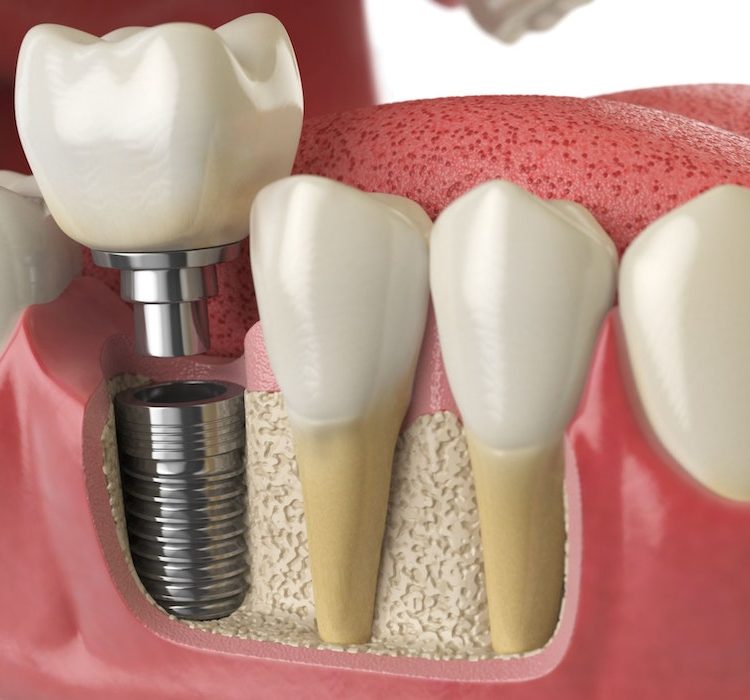What is a Dental Implant?
Dental implants are the most advanced treatment for replacing missing teeth. Implants permanently replace a natural tooth by placing a small titanium post into the jaw under the gumline which is then used to support a tooth, bridge or denture. The post fuses with the bone, creating a custom-fitted tooth, bridge or denture secured to the implant, which holds them firmly in place.
Why Consider Implants?
When a tooth is lost, the jawbone beneath it begins to shrink (or atrophy) and becomes brittle from lack of use. Not only does losing a tooth affect your smile, it also changes the shape of your face, causing it to look sunken and prematurely aged. Losing one or more of your teeth:
- Creates a gap in your smile.
- Causes bone loss.
- Affects your ability to chew properly.
- Altered diet and nutrition can lead to greater overall health issues and a shortened life expectancy.
- Has been associated with heart disease and cerebrovascular disease (strokes).

Digital CT Scan
First our dental radiologist takes a digital 3D CT Scan of your teeth.Professional Consultation
We will discuss your primary issues and your wishes concerning your teeth.Dental Examination
This is followed by a professional examination of the teeth and gums.Complete Treatment Plan
We devise a complete treatment plan for restoring your healthy smile.Benefits of Dental Implants
Improved appearance.
Improved speech.
Improved comfort.
Easier eating.
Improved oral health.
Frequently Asked Questions
A dental implant is an artificial tooth root that is placed into your jaw to hold a replacement tooth or bridge. Dental implants may be an option for people who have lost a tooth or teeth due to periodontal disease, an injury, or some other reason. Our doctors at Dr.Care dental would be more than happy to refer you to an implant surgeon to see if implants are a good option for you. After surgery, we will cosmetically restore the implant with a crown, bridge work, or denture.
Dental implants are designed to last for a long time, sometimes upwards of 5 years or more. When you work with a dental implant dentist in Dr.N.Vinod Gandhi, you should always ask about how often you should get them replaced. You should also contact our office today to see if your dental implants project can be covered by your insurance provider.
With dental bonding, we can match the color of your teeth with a versatile composite resin. This versatile material allows our dentists to make cosmetic repairs and fix minor issues. We can repair chips, correct irregularly shaped teeth, address gaps between teeth, and improve discoloration. What's more, bonding can achieve all these aesthetic goals in just one visit.
Veneers offer our patients a permanent teeth whitening option. We fit these delicate porcelain covers over one or more teeth to address needs such as discoloration, gaps, or short or misshapen teeth
SCHEDULE AN APPOINTMENT FOR A CONSULTATION.

